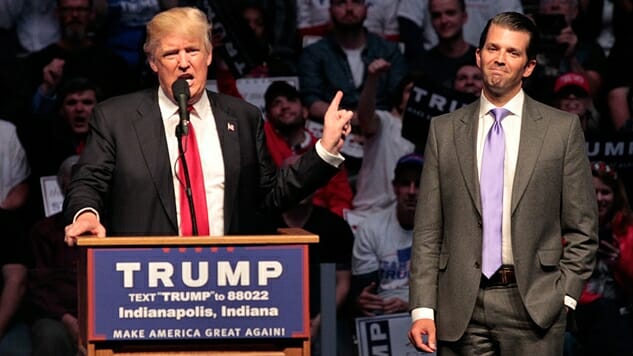Oops, Donald Trump Jr. Did It Again (Wikileaks Edition)
Photo by John Sommers II/Getty
I could link you to the excellent reporting done by Julia Ioffe and The Atlantic to unearth more damning digital communications between someone named Donald Trump and very obvious Kremlin actors, but Junior gave us the goods right from the horse’s mouth. Last year, Trump Jr. was pitched a meeting with “the Crown Prosecutor of Russia” to give him dirt on Hillary, and after that bombshell dropped earlier this summer, Trump Jr. tweeted out a copy of the e-mail—certifying that he did indeed respond “I love it!” in response to an offer of committing a crime. A normal person would understand that confirming stories which look bad for you is not the smartest thing in the world to do, but we’re dealing with Fredo here. He’s not the brightest bulb in the box, and well, he did it again.
Here is the entire chain of messages with @wikileaks (with my whopping 3 responses) which one of the congressional committees has chosen to selectively leak. How ironic! 1/3 pic.twitter.com/SiwTqWtykA
— Donald Trump Jr. (@DonaldJTrumpJr) November 14, 2017
The key takeaway here is this passage from Wikileaks: “Hey Donald, great to see you and your dad talking about our publications. Strongly suggest your dad tweets this link if he mentions us wlsearch.tk.” Why is it so important? Look what the dummy did.
For those who have the time to read about all the corruption and hypocrisy all the @wikileaks emails are right here: https://t.co/SGcEeM9rCS
— Donald Trump Jr. (@DonaldJTrumpJr) October 14, 2016
It may seem innocuous to send that link out, but we have a very clear request coming from an entity whom the American government suspects is a laundromat for Russian intelligence, and the President of the United States’ son executed that order. From a legal perspective, that is very, very bad for baby Donald.
However, many on the left refuse to believe the obvious, and instead pretend that Wikileaks still exists in its initial iteration, and the underlying assumption is that all the financial troubles they endured did not impact their work at all. One glance at Wikileaks’ history reveals this as a patently naïve position. In essence, Wikileaks has always consisted of two outlets: one interested in transparency, and one interested in whatever Julian Assange wants. As the years have passed, the latter has become much more powerful than the former, to the point where Wikileaks is virtually indistinguishable from its corrupt CEO. Julian Assange is not some witty, subversive genius who has noble intentions to save us all from our sinister governments. He’s simply yet another charlatan trying to coopt a self-perpetuating movement. Assange is far closer to being Donald Trump than Edward Snowden.
Wikileaks began as a broke whistleblowing outlet in 2006, sending shockwaves through the world as it exposed government corruption and malfeasance. In 2010, governments fought back, and convinced Visa and MasterCard to halt payments to Wikileaks, quickly strangling the organization to near death. Later that year, in an interview with Russia’s top daily newspaper, Kommersant, Wikileaks spokesman Kristinn Hrafnsson teased an upcoming document dump, saying that “Russian readers will learn a lot about their country. We want to tell people the truth about the actions of their governments.”
In response, an official at the FSB (the successor to the KGB), told LifeNews that “It’s essential to remember that given the will and the relevant orders, [WikiLeaks] can be made inaccessible forever.” The documents never came out. A year later, Wikileaks was in far better financial shape, and Julian Assange had his own show on Russia Today—which just registered with the U.S. government as a foreign agent. While holed up in the Ecuadorian embassy in 2015, Assange stated in a press release that he requested Russian security. One year later, Wikileaks would turn down documents on the Russian government at the same time that they were leaking as many Democratic Party e-mails as possible during the election—with a daily dump beginning the moment the Access Hollywood tape dropped in October.
Their actions last October should have removed all doubt as to whether Wikileaks’ prime motivation is transparency, because an agency truly interested in illuminating the actions of our leaders behind closed doors would publish the whole cache at once, instead of the drip drip drip of daily tidbits specifically designed to influence the news cycle. This had the benefit of distracting America from sexual assault revelations that should have ended Trump’s presidential campaign. It’s hard to see how Trump survives last October without the daily Wikileaks e-mail dumps to pivot towards (which I might add, were quite boring. The DNC leaks in the summer were substantive, but the Podesta leaks in October were simply mundane examples of the inner machinations of a political party). To top it off, Bill Maher accused Assange of being under the thumb of the Russian government last August, and Assange didn’t deny it.
-

-

-

-

-

-

-

-

-

-

-

-

-

-

-

-

-

-

-

-

-

-

-

-

-

-

-

-

-

-

-

-

-

-

-

-

-

-

-

-









































